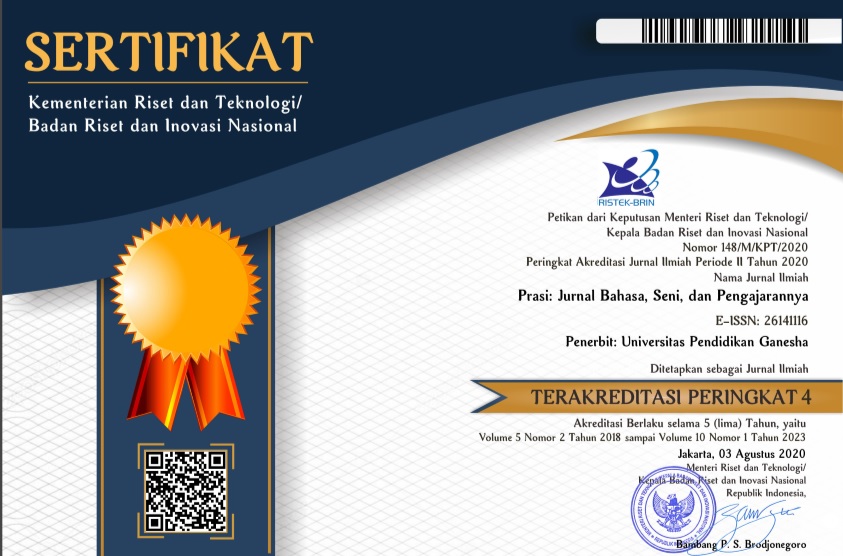EFEKTIVITAS APLIKASI KANJI MEMORY HINT 2 TERHADAP KEMAMPUAN KANJI DASAR MAHASISWA PENDIDIKAN BAHASA JEPANG, UNIVERSITAS RIAU
DOI:
https://doi.org/10.23887/prasi.v19i01.69797Keywords:
Efektivitas;, aplikasi;, Kanji Memory Hint 2;, kemampuan kanjiAbstract
This study was conducted to determine the effectiveness of the Kanji Memory Hint 2 application on basic kanji abilities in students of the class of 2022 of the Japanese Language Education Study Program, Riau University. The sample used in this study amounted to 37 people who were students of the class of 2022 of the Japanese Language Education Study Program, Riau University. This research is experimental research with a one group pre-test post-test design. Data were collected using tests in the implementation of pre-test and post-test. From the pre-test and post-test data were then analyzed using paired sample t-test. It was found that the paired sample t-test result of 0.000 so that it can be interpreted that the Memory Hint 2 Kanji application is effective for the kanji ability of students of the class of 2022 of the Japanese Language Education Study Program, Riau University. It can be concluded that the Memory Hint 2 Kanji is able to improve student’s ability to memorize the meanings of kanji, read and use kanji
Keywords : Effectiveness, app, Kanji Memory Hint 2, kanji skills.
Abstrak
Tujuan dilakukannya penelitian ini adalah untuk mengetahui efektivitas dari aplikasi Kanji Memory Hint 2 terhadap kemampuan kanji tingkat dasar pada mahasiswa angkatan 2022 Program Studi Pendidikan Bahasa Jepang, Universitas Riau. Sampel yang digunakan pada penelitian ini berjumlah 37 orang yang merupakan mahasiswa angkatan 2022 Program Studi Pendidikan Bahasa Jepang, Universitas Riau. Penelitian ini merupakan penelitian eksperimen dengan desain one group pre-test post-test. Data dikumpulkan menggunakan tes pada pelaksanaan pre-test dan post-test. dari data pre-test dan post-test tersebut kemudian dianalisis menggunakan uji paired sample t-test. Didapati hasil uji paired sample t-test sebesar 0.000 sehingga dapat ditafsirkan bahwa aplikasi Kanji Memory Hint 2 efektif terhadap kemampuan kanji mahasiswa angkatan 2022 Program Studi Pendidikan Bahasa Jepang, Universitas Riau. Dapat disimpulkan bahwa aplikasi Kanji Memory Hint 2 mampu untuk meningkatkan kemampuan mahasiswa dalam menghafal makna, membaca dan menggunakan kanji.
References
Aryani Safithry, E. (2018). Asesmen Teknik Tes dan Non Tes. Purwokerto: CV IRDH, 1.
Fakih, M., & Setiawati, N. (2018). Efektivitas Media Pembelajaran (Kartu Kanji & Flash Card) terhadap Kemampuan Membaca Kanji. Kagami: Jurnal Pendidikan dan Bahasa Jepang, 9(1), 47–61.
Hastjarjo, T. D. (2019). Rancangan Eksperimen-Kuasi. Buletin Psikologi, 27(2), 187. https://doi.org/10.22146/buletinpsikologi.38619
Huda, M. J., & Pertiwi, A. Y. (2018). Keefektifan Media Audiovisual terhadap Motivasi Belajar Siswa di Sekolah Dasar. Jurnal Pendidikan:, 2(4), 332–337.
Kacetl, J., & Klímová, B. (2019). Use of Smartphone Applications in English Language Learning—A Challenge for Foreign Language Education. Education Sciences, 9(3), 1–9. https://doi.org/10.3390/educsci9030179
M. McGee, L., & Donald, J. R. (1989). “‘K Is Kristen’s’: Learning the Alphabet from a Child’s Perspective.” The Reading Teacher, 43(3), 216–225.
Marzuki, M. (2021). Upaya Meningkatkan Kesadaran Generasi Muda tentang Pentingnya Belajar Bahasa Asing. Jurnal. Unmuhjember.Ac.Id, 1(2), 61–70. Retrieved from http://jurnal.unmuhjember.ac.id/index.php/ABDI/article/view /6343
Rasiban, L. M., Sudana, D., & Sutedi, D. (2019). Using Mnemonic-Based Applications to Learning Japanese Hiragana Characters. 254(Conaplin 2018), 12–16. https://doi.org/10.2991/conaplin-18.2019.96
Saddam Husein, S. U. M. S. S. (2018). Urgensi Media dalam Proses Pembelajaran. Al-Iltizam: Jurnal Pendidikan Agama Islam, 3(2), 237. https://doi.org/10.33477/alt.v3i2.605
Siska Mustika, Sanjaya, S., & Machawan, A. E. R. (2018). Keefektifan Aplikasi Android “Kanji Memory Hint 2” dalam Meningkatkan Kemampuan Membaca dan Menulis Kanji.
Tokuhiro, Y. (2010). "Gainen Chizu wo Mochiita Kanji Goi Gakushu”dalam Nihongo Kyoushi no Tameni Jissen Kanji Shidou.
Downloads
Published
Issue
Section
License
Copyright (c) 2024 Muhammad Amarullah, Nana Rahayu, Adisthi Martha Yohani

This work is licensed under a Creative Commons Attribution-ShareAlike 4.0 International License.
Authors who publish with Prasi agree to the following terms:- Authors retain copyright and grant the journal the right of first publication with the work simultaneously licensed under a Creative Commons Attribution License (CC BY-SA 4.0) that allows others to share the work with an acknowledgment of the work's authorship and initial publication in this journal
- Authors are able to enter into separate, additional contractual arrangements for the non-exclusive distribution of the journal's published version of the work (e.g., post it to an institutional repository or publish it in a book), with an acknowledgment of its initial publication in this journal.
- Authors are permitted and encouraged to post their work online (e.g., in institutional repositories or on their website) prior to and during the submission process, as it can lead to productive exchanges, as well as earlier and greater citation of published work. (See The Effect of Open Access)


.png)
.png)









